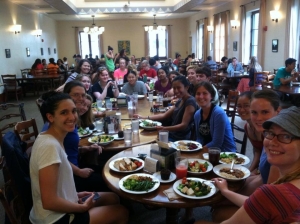Scripps College senior Dana Shaker ’14 had enough on her plate without having to worry whether the food on her plate would make her ill. Shaker has multiple food allergies, and as a first-year student in 2010, she discovered the need for a systematic approach to feeding students with restricted diets.
“I knew living in a residential college environment with a meal plan would be a challenge,” says Shaker, a rising first-year student at Georgetown University Law Center who is interested in food law and policy. “So, I met with the head chef to discuss just that. He was willing to help, and our first solution was for me to ask about ingredients in prepared dishes. If nothing was suitable, the dining hall would cook a separate meal for me.”
“But within weeks, that approach proved inefficient and unsustainable. I could not find foods I could eat, and I felt like a burden asking for a customized plate at busy meal times,” says Shaker, who is from Niles, Ohio. “Not wanting to put a strain on the dining hall staff, and aware more students than I needed allergy-free food, I approached Scripps about creating a separate food station free of the top eight food allergens: dairy, eggs, gluten, peanuts, tree nuts, seafood, shellfish, and soy.”
Shaker’s collaboration with dining staff and Sodexo, the campus’ food services partner, resulted in the allergy-free food station, a regular fixture at the Elizabeth Hubert Malott Commons dining hall since November 2010. The station offers a delicious array of proteins, starches, and vegetables at each lunch and dinner.
Interest has grown to accommodate more than 500 meals per day at the now expanded Heathy U Station, which also offers vegan and vegetarian fare. Dining hall staff receive food preparation training and work exclusively at Healthy U to minimize cross-contamination, says Tom Adkins, Malott Commons general manager.
Dining halls at colleges and universities have grown more aware of the need to offer allergy-free options in the wake of a 2012 agreement between the U.S. Department of Justice and Lesley University in Cambridge, Mass. The settlement states schools must offer students with restricted diets allergy-free meals.
Scripps College, however, had been working with Shaker and other students at least two years before the federal case. “Scripps was, and still is, ahead of the curve,” Shaker says.
The decision to offer allergy-free meals was swift because Scripps strives to be responsive to the needs of its students, especially when their health is at stake, Adkins says: “We saw there was a great need for allergy-free choices and we quickly adopted the idea.”

Dana Shaker ’14 swimming as part of CMS Athletics. She was awarded Female Scholar-Athlete of the year.
These healthy alternatives made all the difference to Shaker. She successfully managed a full schedule of rigorous academic and extracurricular activities while at Scripps; this past year, the sociocultural anthropology major earned the 2014 Claremont-Mudd-Scripps (CMS) Female Scholar-Athlete of the Year Award and became a member of Phi Beta Kappa, the nation’s oldest academic honor society.
“I’m convinced none of this would have happened without the allergy-free station,” she says. “What Scripps understands is that dietary-restricted students deserve to eat safely and quickly in a social environment, just like their non-dietary-restricted peers,” she says.
Approximately 15 million Americans have food allergies, according to estimates from Food Allergy Research and Education, a Virginia-based non-profit organization dedicated to food allergy awareness and advocacy. Between 1997 and 2011, the number of U.S. children under the age of 18 with food allergies increased by 50 percent, according to the Centers for Disease Control and Prevention. Many health experts say this spike foreshadows an increasing number of first-year students who will require allergy-free options at their respective dining halls.


